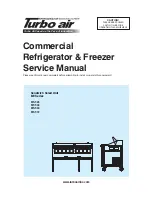
6
Do not touch the plug with wet
hands when plugging in or
unplugging the product.
Do not plug in the refrigerator if the
wall outlet is loose.
For safety reasons, water should
not be sprayed on inner or outer
parts of the product.
To avoid fire and explosion risk, do
not spray substances containing
inflammable gases such as
propane near the refrigerator.
Never place containers filled with
water on top of the refrigerator; in
the event of spillages, this could
cause electric shock or fire.
Do not overload the refrigerator with
food. The food items could fall and
hurt you and damage the
refrigerator when you open the
door.
Never place objects on top of the
refrigerator; these objects could fall
when you open or close the
refrigerator door.
As they require a precise
temperature, vaccines,
heat-sensitive medicine and
scientific materials, etc., should not
be kept in the refrigerator.
If not to be used for a long time, the
refrigerator should be unplugged. A
possible problem with the power
cable could cause a fire.
The tip of the plug should be
cleaned regularly with a dry cloth;
otherwise, it could cause a fire.
Properly securing adjustable legs on
the floor can prevent the refrigerator
from moving.
When moving the refrigerator, do
not hold it by the door handle. The
handle might snap off.
When you have to place your
appliance next to another
refrigerator or freezer, the distance
between devices should be at least
8cm (~ 3"). Otherwise, moisture
might form on the adjacent side
walls.
Child safety
If the door has a lock, the key should
be kept out of the reach of children.
Children must be supervised to
prevent them from tampering with the
appliance.
DANGER!
Risk of child entrapment!
Child entrapment and suffocation are
not problems of the past. Junked or
abandoned appliances are still
dangerous, even if they will “just sit
around for
a few days”.
Before discarding your old refrigerator:
Take off the doors.
Leave the shelves in place so that
children may not easily climb inside.
- SAVE THESE
INSTRUCTIONS -







































